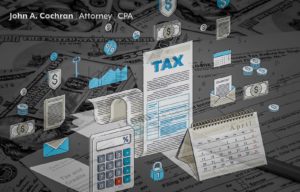Tax Planning for Consistency is a blog that goes right along with our previous tax planning article to eliminate surprises and save money. Now that the dust has settled with tax season, let’s take a look back at what happened. Were you surprised by how little you got back in your refund this year? Or maybe you owed more than you’d expected? Safe to say, surprises from the IRS generally don’t mean good news. When you do tax planning for consistency every year, you’ll find you’re less and less surprised each April. But you have to do your homework… or know someone who can help you.

Better Planning Eliminates Surprises
Instead of waiting until somewhere around mid-April to get a handle on your tax responsibilities, review them quarterly. If you own a small business, that means making payments or submitting loss statements on quarterly tax estimates.
Additionally, review your purchasing needs for new equipment or evaluate how other expenses might impact your tax responsibilities. Consider any new employees or contracts you’ve taken on. This is also a good time to review profits and losses to help you better plan for the next quarter.
Not only that, but you can also get a better idea of how well you’ve accounted for year-end taxes. Also, by sending accurate quarter tax estimate payments you eliminate those pesky late penalties the IRS loves to tack on.
When you take time to plan out your strategy, you can attack your taxes each year in more manageable chunks. Then you get a more consistent (and reliable) idea of your tax liability.
Changes in Tax Law
The IRS likes to keep everyone on their toes by changing the rules every year. Everything from standard deduction and tax brackets shifts pretty much annually. But pandemic-related tax provisions made things even more complicated, especially when they went away.
Occasionally, changes in tax laws work to your advantage, but sometimes only temporarily. For example, the child and dependent care credit boosted the maximum credit percentage in 2021 (up to 50%) dropped to 35%. And while it was fully refundable in 2021, that’s no longer the case in 2022.
But more likely you saw things like unemployment income taxed again. In 2020, the American Rescue Plan allowed impacted individuals to waive up to $10,200 of paid unemployment. In 2021? If you didn’t already withhold taxes from your benefits, unemployment compensation taxation may have come as a surprise.
Finally, unsure of how to get started? Relax! Our experienced tax professionals have helped hundreds of taxpayers just like you. We’ll help you understand how the latest changes in the tax code might affect you. And we’ll help you plan your year for better consistency. Complete our online form or call us today at 724-216-5180 to learn more.



